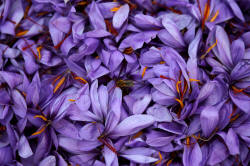Greece's 'red gold': saffron trade blooms in wilted
economy
 Send a link to a friend
Send a link to a friend
 [November 08, 2018]
By Karolina Tagaris [November 08, 2018]
By Karolina Tagaris
KROKOS, Greece (Reuters) - Every autumn,
Zisis Kyrou is more often found plucking flowers in northern Greece's
purple saffron fields than in his office as a civil engineer.
Saffron - the spice so expensive it's called "red gold" - has brought
jobs and money to a region better known for coal mines and unemployment.
A year ago, its producers began exporting to the United States. Now
they're looking to China.
Most are young Greeks who were shut out of the job market during
Greece's nine-year economic downturn. They returned to the countryside
to make a living off the land.
"It was hard to find work in your field during the crisis, particularly
in civil engineering, because there was no construction," said Kyrou,
34, as he harvested with pollen-stained hands.

In 2012, he returned to Greece from London with two university degrees.
He eventually opened an engineering office in his village of Krokos, but
most of his income comes from his four acres of land, which he hopes to
increase.
"I didn't imagine I'd return," he said. "But it was a decision I don't
regret."
Greeks have been cultivating saffron for three centuries in the
countryside surrounding Krokos, which takes its name from Crocus, the
saffron flower. Alexander the Great is said to have used it to heal
battle wounds.
But until 2000, production was limited to 30 kg a year for domestic
consumption, said Nikos Patsiouras, who heads Greece's Cooperative of
Saffron.
That changed in 2008, when the crisis hit. Greece now produces about
four tonnes a year, 70 percent of which goes abroad. The Cooperative has
doubled its members from 494 to 1,000. It also has increased its land
from 592 acres in 2008 to 1,349 acres.
[to top of second column] |

A bee is seen on saffron flowers in a field in the town of Krokos,
Greece, October 27, 2018. REUTERS/Alkis Konstantinidis

"A lot of young people found work in the fields - scientists," Patsiouras said.
"I believe more will join."
Signs of the crisis are visible across Krokos, where shuttered shops line the
streets. Unemployment in northwestern Greece is 23.5 percent, three points
higher than the national average. But the fields are abuzz.
"We have God on our side, who gave us such a unique product," Patsiouras said.
"We hold on to it like the apple of our eye."
Saffron grows only in this region of Greece. Marketed as Krokos Kozanis, one
gram costs about four euros in Greek shops.
It takes 150,000 flowers to make a kilo of the spice, which sells for about
1,500 euros. Flowers are handpicked, and at the cooperative women in blue
overall weigh and package it. They are forbidden to wear make-up and perfume, to
protect its flavour.
Iran is by far the world's biggest saffron producer, but demand for the Greek
variety is rising, Patsiouras said. Greece is in talks with China for exports in
2019.

In the Patsiouras household, three generations have gathered after a day of
harvesting to remove the saffron strands from the flowers and dry them.
"If we don't transfer this tradition to the next generation, we will fail," said
his daughter-in-law, Maria Patsioura.
(Editing by Larry King)
[© 2018 Thomson Reuters. All rights
reserved.] Copyright 2018 Reuters. All rights reserved. This material may not be published,
broadcast, rewritten or redistributed.
Thompson Reuters is solely responsible for this content. |